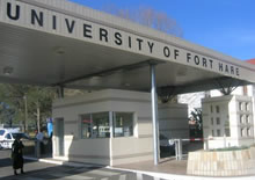
The Portfolio Committee on Higher Education, Science and Technology has raised concerns over what seemed to be the deterioration and neglect of historically black universities, especially the Alice-based University of Fort Hare (UFH).
Committee member, Ms Nompendulo Mkhatshwa, said she did not understand how the UFH seemed to be struggling on governance, administration and output, when it had the heritage it had. “Most prominent leaders on the continent attended Fort Hare. How fundamental is it for us to get it right, these institutions have grown to be challenged and are the least performing? The UFH is prone to student to protests,” Ms Mkhatshwa said.
She sought clarity on the institutional culture at Fort Hare, and whether it allowed students to flourish and be proud of being alumni. “What programmes are there for students to feel that they are part of the culture.”
She said it was not correct that given Fort Hare’s history, young people did not want to go to Fort Hare. “This is the reality we have with TVETs (Technical and Vocational Education and Training colleges) as well.”
Fort Hare has been placed under administration for more than a year, and the Administrator, Prof Sandile Nongxa, told members that the institutional culture of Fort Hare was toxic.
The Vice-Chancellor, Prof Sakhela Buhlungu, said things were changing for the better, and that throughout the process of turbulent governance, the academic programme remained undistracted. “The main thing is to fix management and governance. Those pushing forward the university had taken a lot of strain. Last year we had an eight-week strike that was about wages,” he said.
Members sought clarity on various issues, including the Auditor-General’s (AG’s) disclaimer, infrastructure, student accommodation, the term of the Administrator, contracts that resulted in a qualification, the dropout rate, and the water challenges on campus.
The Chairperson of the committee, Mr Philly Mapulane, sought clarity on how Fort Hare would respond to the AG on the coming audit cycle. “It looks like the situation is dull on the infrastructure, especially water. What discussions are there with the municipality and the Department of Water and Sanitation to address this challenge?”
Committee member, Mr Nodada, said it was worrying that the majority of the institutions that came before the committee were in crises.
Prof Buhlungu clarified that the dropout issue was a challenge across all institutions, and that the number rose after the fees must fall, but also that admissions seemed to increase too. It was revealed that the university was doing well in constructing student villages.
“When you are a Harvard graduate you could not be unemployed. You need to instil this culture at Fort Hare, that should be spearheaded by the Student Representative Council,” said Ms Mkhatshwa.
The Vaal University of Technology was scheduled to appear before the committee as well on governance and administration challenges, but had apologised.
By Sibongile Maputi
20 November 2019

